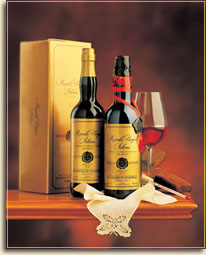From the viticultural
standpoint, Marsala is the leading commune of the
province--Trapani-- where the vine is most extensively
cultivated in Italy.
The origins of grape-growing and winemaking in the Marsala area
go back to the period of Phoenician colonization (8th-6th
centuries BC). In the period of Greek supremacy, Marsala rose to
a position of great importance and in the 3rd century BC its
port was the most important wine market of the Mediterranean
basin. There are no extant documents describing viticulture in
the Roman or immediately succeeding periods. However, the wine
made in the area must have been outstanding, since it deeply
impressed John Woodhouse, an English merchant and a great
admirer of Spanish and Portuguese wines, who arrived in Marsala
in 1770 to purchase almonds. He was sufficiently impressed by
the local output that he immediately acquired 20,000 liters of
Marsala wine to be shipped to England. That was the first act in
the Marsala legend-it was Woodhouse himself who coined the wine's
name. His enterprise proved so successful that Woodhouse
acquired a big warehouse near the town's port, where he set up a
wine house. Lord Horatio Nelson also made a major contribution
to the establishment of Marsala's reputation in England through
his purchase of a large supply of the wine, which he described
as "worthy of the table of any gentleman.''
Another Britiah merchant, Benjamin Ingham, also had a vital
impact on the production of Marsala. In 1812, he constructed a
facility next to the existing warehouse of his compatriot. It
was Ingham who made the wine known throughout the world,
exporting it to countries as distant as Australia. In 1834, he
published a manual dealing with the harvesting of the grapes
that was aimed at correcting the defects of local growers.
The contribution of Calabrian Vincenzo Florio, known as the "father
of the Sicilian wine trade,'' represents another chapter in the
history of Marsala. In 1832, Florio set up his company in the
midst of the facilities of his British competitors. His
establishment occupied a full kilometer of frontage along the
sea. It was the first Italian vinicultural enterprise of an
industrial type. In 20 years, Florio, who was also the owner of
a steamboat firm, succeeded in taking over many of the markets
first developed by his English-speaking competitors and becoming
the leader in the trade at Marsala.
The celebrated wine knew at least a century of great success but
triumph was followed by a long period of progressive decline in
the wine's image, during which production far exceeded the
market's capacity of absorption. Proposals by the Marsala
producers for the relaunching of the wine were transformed into
a series of laws, enacted in 1984, that tightened the production
discipline and restored the wine to its due level of prestige.
Production entities: 3,065 producers.
|
 |